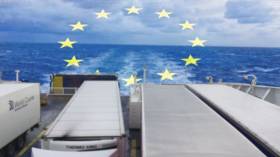Ferry & Car Ferry News The ferry industry on the Irish Sea, is just like any other sector of the shipping industry, in that it is made up of a myriad of ship operators, owners, managers, charterers all contributing to providing a network of routes carried out by a variety of ships designed for different albeit similar purposes.
All this ferry activity involves conventional ferry tonnage, 'ro-pax', where the vessel's primary design is to carry more freight capacity rather than passengers. This is in some cases though, is in complete variance to the fast ferry craft where they carry many more passengers and charging a premium.
In reporting the ferry scene, we examine the constantly changing trends of this sector, as rival ferry operators are competing in an intensive environment, battling out for market share following the fallout of the economic crisis. All this has consequences some immediately felt, while at times, the effects can be drawn out over time, leading to the expense of others, through reduced competition or takeover or even face complete removal from the marketplace, as witnessed in recent years.
Arising from these challenging times, there are of course winners and losers, as exemplified in the trend to run high-speed ferry craft only during the peak-season summer months and on shorter distance routes. In addition, where fastcraft had once dominated the ferry scene, during the heady days from the mid-90's onwards, they have been replaced by recent newcomers in the form of the 'fast ferry' and with increased levels of luxury, yet seeming to form as a cost-effective alternative.
Irish Sea Ferry Routes
Irrespective of the type of vessel deployed on Irish Sea routes (between 2-9 hours), it is the ferry companies that keep the wheels of industry moving as freight vehicles literally (roll-on and roll-off) ships coupled with motoring tourists and the humble 'foot' passenger transported 363 days a year.
As such the exclusive freight-only operators provide important trading routes between Ireland and the UK, where the freight haulage customer is 'king' to generating year-round revenue to the ferry operator. However, custom built tonnage entering service in recent years has exceeded the level of capacity of the Irish Sea in certain quarters of the freight market.
A prime example of the necessity for trade in which we consumers often expect daily, though arguably question how it reached our shores, is the delivery of just in time perishable products to fill our supermarket shelves.
A visual manifestation of this is the arrival every morning and evening into our main ports, where a combination of ferries, ro-pax vessels and fast-craft all descend at the same time. In essence this a marine version to our road-based rush hour traffic going in and out along the commuter belts.
Across the Celtic Sea, the ferry scene coverage is also about those overnight direct ferry routes from Ireland connecting the north-western French ports in Brittany and Normandy.
Due to the seasonality of these routes to Europe, the ferry scene may be in the majority running between February to November, however by no means does this lessen operator competition.
Noting there have been plans over the years to run a direct Irish –Iberian ferry service, which would open up existing and develop new freight markets. Should a direct service open, it would bring new opportunities also for holidaymakers, where Spain is the most visited country in the EU visited by Irish holidaymakers ... heading for the sun!






























































